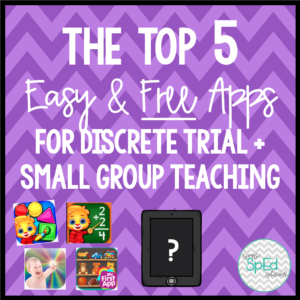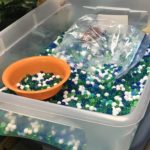 **Caution, if you couldn’t tell by the title, this series may have some iffy language, if you’re easily offended, it may not be for you!**
**Caution, if you couldn’t tell by the title, this series may have some iffy language, if you’re easily offended, it may not be for you!**
Hello friends!
Welcome to my new Pet Project! The Sh*t They Don’t Tell You About Teaching Special Education!
I was inspired to write this series of posts while reading a similar book about Pregnancy and Newborns when I had my first kid. I thought, “Hmm, this is some real shit, I wish they had this stuff about my job when I first started…” This became more deeply my stance when I kept hearing stories from new Special Educators (Or Educators in general) listing all of the things that they DID NOT learn in Grad school! I mean, what is even the point of going through 4 years of college and getting a post graduate degree if they aren’t going to prepare you for the Real World of Education?!
And so this blog series was born.
If you are a General Educator, Para-educator, etc, don’t worry! While most of this series was written from and for a Special Educators perspective, I’m sure you’ll find the information, and maybe even the humor, relative to your jobs as well.
Now as I mentioned above, the language may be a bit iffy. And the topics may get a little intense. I do not mean to cause a debate, although I welcome rational (lol) human conversations and discussions in the comments . This information is coming from both my experience in the field, as well as actual research and discussions with other educators in the field. So it’s not all just my opinions. But some of it is (it is My Blog after all). So take it with a grain of salt and hopefully a glass of wine, and realize that while I hope you relate or learn something, it is also meant as entertainment.
So lets dive right in to the First Post in this series:
What The Eff Can I Do With This SPED Degree?
Oh my sweet summer child, the opportunities are endless!
No really. You have a LOT of options.
In some states (California for example) you need to choose the direction you want to take your career before you get your degree. The credential choices can include Mild/Moderate, Moderate/Severe, Deaf/Hard of Hearing, Visually Impaired, Orthopedic Impairment, etc etc. And will all depend on where you ultimately see yourself teaching.
A lot of teachers I think are ‘afraid’ of that SpEd degree because they think that it will pigeon-hole them into a Self Contained Classroom or with learners they don’t think they can handle (trust me though, you can). But that is so not the case! Perhaps you see yourself leading a pull out Learning Center for kiddos with dyslexia and learning disabilities, or run a class for Emotionally Disturbed high schoolers, then a Mild Moderate Credential is the way to go.
If you see yourself working with kiddos with Autism or Multiple Disabilities, you should probably go for your Mod/Severe.
If you specifically want to work with people who are Deaf or Blind, you may need to try for a more specific credential of VI or DDH.
You don’t need to know everything before you get your credential, but considering it is going to cost money and take up years of your life, I suggest you have some idea.
My personal opinion, even if you are afraid of the ‘bigger’ disabilities (the fear is just of the unknown y’all), go for your mod/severe. Many places will hire a mod/severe for a mild/mod position anyways. But not the other way around.
Now let’s dig a little deeper into what exactly you might be doing with your fancy new credential. Chances are, your program required at least some volunteer work or student teaching, so you should know what kind of program you COULD get. I suggest volunteering/working in as many different types as possible before needing to get a real person job. Maybe you even got lucky and were able to Intern during your credential! An internship is a *PAID* big boy/girl teaching job that you can have while you are still in school. Usually your school will hook you up with a mentor and you still have to take all your classes and go to all your mentorship meetings. While this sounds like a lot, and yes it usually is, it is an easy way to get into the field and pay your rent at the same time. More on internships at a later date. If you can’t intern, districts are ALWAYS hiring subs and paraeducators/instructional assistants! Another brilliant way to get into the field and find your dream classroom.
Once you have whatever your state/country requires for the field, it is time to job hunt! Lets hope you made some connections during your student teaching/volunteer work because Special Education jobs are so hard to get! *Insert Sarcasm Emoji here so you know I’m kidding*. But seriously, unless the teaching world drastically changes in the next 5 years, I think it’s pretty safe to say that you have some job security. At this point, the hardest thing is just making sure all of your paperwork is in order. Did you know after I got my MASTERS degree and CREDENTIAL, I still needed to pass 3 state tests and pay a fee to register with the state? Do you know any other job where they do that? I mean maybe Doctors? But med school? No thanks. (Although my pay might be a little better….)
If your state has a job site for education positions, it would definitely be worth it to sign up. Many districts in California post jobs with EDJOIN.ORG. Once you upload your resume, tests passed, and credential, then its an easy few clicks to browse and apply for a teaching job. If they don’t have an Edjoin equivalent and you find yourself searching through districts, you can help yourself out by searching using Google Keywords. Instead of searching by going through each districts webpage, you can search specific phrases on google and hopefully get narrowed down results. This also helps if you aren’t really specific about where you want to be.
However if you have a dream district, you can stalk their job boards and hope something comes up, or you can send your resume and a stellar Cover Letter directly to HR and try to sweet talk them into an interview.
But let’s get real again for a sec, Your first job is probably going to suck.
Hey you may get lucky and find something you love right off the bat. But chances are, you wont be in love with your first teaching job. AND THAT IS OKAY! Between the ridiculous learning curve, the difference between districts, and the fact that no two children with disabilities are alike, you couldn’t possibly have been fully prepared! And hopefully no crazy admin is expecting you to be. My first teaching job was an internship. I started late October to a Self Contained Autism Program that had been completely taken over by a new district. They were understaffed. We were on an old run down elementary campus. We had significant behaviors I had never experienced before. I cried quite a few days on my 45 minute commute home. I luckily had kind paras and a dedicated admin that helped me survive and thrive. And though I ended up moving and leaving that job, it will always hold a special place in my heart as a place I learned SO MUCH.
I am not scared to admit that my new classroom is classroom number 4 for me as a teacher. I have taught in a Non-Public Setting, an LD Middle School classroom, a K-6 for Severe/Profound multiple disabilities, and currently I am in a K-2 Autism Classroom. I have been in charge of as few as 1 paraeducator and as many as 6. I have been the newbie on campus and the more experienced one. And though I definitely did not LOVE every position, I was able to LEARN from each and every second.
My point being, you may not like it at first. It may take you a while to crack where you fit in this vast system. There is SO much opportunity and diversity in the SpEd World. Stick to your strengths and remember that even though they probably did not teach you this in grad school, it’s OK to not know what you want to do with your shiny new SpEd degree yet.
–
Thank you so much for taking the time to read! If you liked it, leave a comment below or on my Instagram @funfunctionaleducation. And stay tuned for the next post in the series: TSTDTY About How to Nail Your Teacher Interview!


 **Caution, if you couldn’t tell by the title, this series may have some iffy language, if you’re easily offended, it may not be for you!**
**Caution, if you couldn’t tell by the title, this series may have some iffy language, if you’re easily offended, it may not be for you!**











